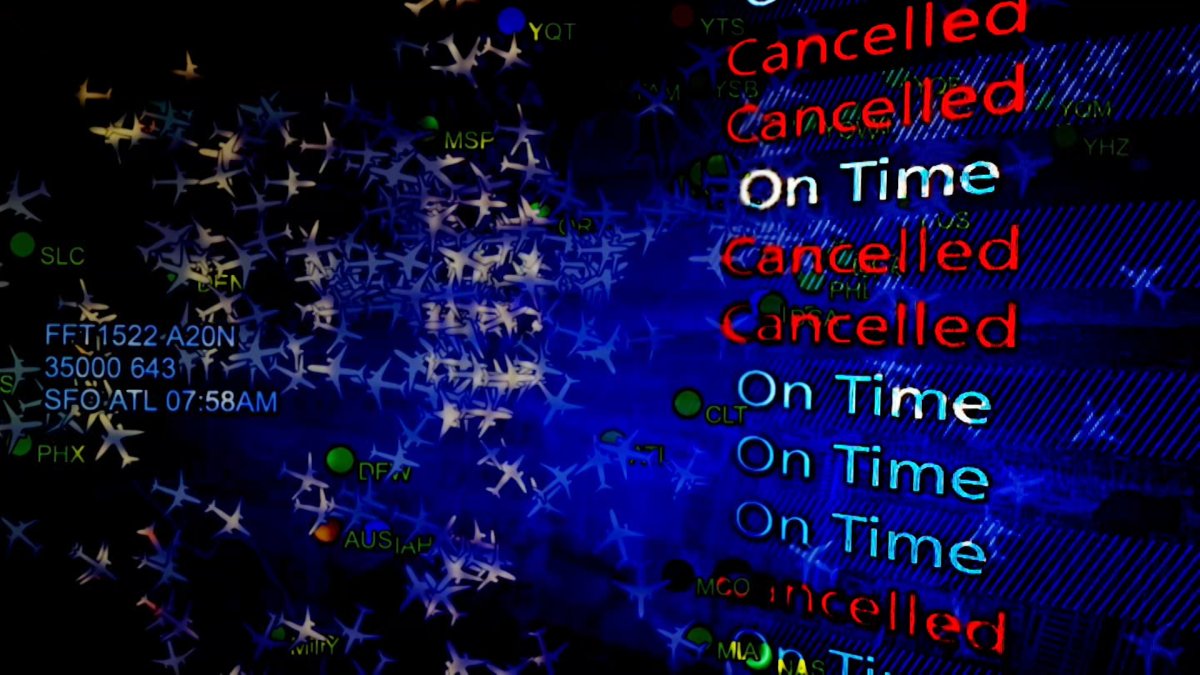
After airlines saw repeated delays and cancellations over the summer, will things improve during holiday travel this year? Chris Chmura and our consumer team lays out tips to protect yourself during holiday travel.
The airlines landed a beatdown from the feds this summer because of repeated delays, waves of cancellations, and mountains of lost luggage.
So, should we expect a sequel for the holidays? We found some signs of airline improvement. But there’s also some drama, and good reason to buckle up in case it gets bumpy again.
Now boarding? Nonstop trepidation.
“I think there’s some hesitation going into this holiday season,” said Emily Thornton of Insuranks.com.
Get a weekly recap of the latest San Francisco Bay Area housing news. Sign up for NBC Bay Area’s Housing Deconstructed newsletter.
Insurance comparison site Insuranks.com recently surveyed 1,000 people about flights.
“71%, nearly three in four people are worried about delays and cancellations for upcoming trips,” Thornton said.
And justifiably so!
Rewind back to summer.
Airlines delayed or cancelled thousands of flights.
Passengers saw long delays and found themselves waiting at the airport and on hold with customer service for hours.
So is flying any better now for the winter holidays? We turned to flight tracking company FlightAware.
“There’s just tens of thousands of aircraft we’re tracking around the globe every day,” said Kathleen Bangs of FlightAware.
Over the summer, Uncle Sam found upwards of 30% of all flights arrived late.
Recently, FlightAware found 17% delayed and the amount of time passengers are stuck has shortened.
“This summer, delays were reaching about one hour on average,” Bangs said.
“Now, that’s winding down to about 45 minutes, which we like to see,” she continued.
Best on-time record between September and November: Delta.
Worst? Frontier and JetBlue.
Frontier did not respond to us.
JetBlue said 70% of its flights go to or through “the congested weather-prone northeast [U.S.] corridor, [so] JetBlue in particular feels these impacts and downline delays.”
JetBlue noted that it’s recently cancelled zero San Francisco International Airport flights.
That’s way better than the summer.
In June: airlines overall cancelled 3% of all flights.
Now: FlightAware data show one 1.2% are getting grounded.
“Some days, less than one percent of flights are cancelled in the U.S.,” Bangs said, “Actually, we’ve seen it get down to half a percent”
The wait for help has improved too.
Our intern Amelia and Consumer Investigator Chris Chmura made test calls over the summer. It took them hours to get an agent to call them back. More recently, they were able to reach a human within five or six minutes.
Over the summer, passengers paid the price for an airline staffing shortage. Since May, airlines have hired eleven thousand additional workers. But some personnel problems persist.
Picketing pilots say airlines are overscheduling with too much reliance on overtime.
“We’re not striking,” one pilot said, “we’re just doing an informational picket.”
Right, no strike. But some pilots are refusing overtime shifts. That can cause delays and cancellations with less wiggle room than legroom.
“There are fewer airline routes, in terms of options, than there once were,” said Kevin Brasler, editor of Consumers’ Checkbook.
“And the planes are a lot fuller,” Brasler continued. “So, when there’s even a small disruption there’s a ripple effect for days.”
Consumers’ Checkbook recently published 60 travel tips.
Here are a few:
- Pack some essentials in your carry on just in case your trip takes longer.
- Hunt down information in advance about the next few flights to your destination -- in case your flight gets grounded.
- Download the airline app and subscribe to alerts. Be first to know if there’s trouble.
- If there’s a problem, react immediately because you’ll be competing with everyone else on your flight to rebook a seat.
“Those passengers get spread out across several flights, and there are just no empty seats to accommodate them,” Brasler explained. “That’s really been the big problem, and I don’t know when that’s going to go away.”
Kathleen Bangs at FlightAware recommends everyone check the forecast before flying.
“Have an idea a few days in advance: What are the big weather fronts?” Bangs suggested.
When there’s trouble on the radar, airlines often issue fee waivers in advance. They might let you go earlier, later, or to a different city at no extra cost.
“If they see there’s a weather impact to your flight, they’ll actually want you to proactively contact them,” Bangs said.
Do that on the phone. Or try social media.
Over the summer airlines answered our direct messages on social media faster than they answered our phone calls.
What about lost luggage? Uncle Sam says 99.3% of bags made it in August.
Still, more than 200 thousand bags are lost or mishandled each month.
To track your luggage, consider a WiFi tracker like an AirTag. You drop it in your bag, and if it’s close to WiFi wherever it goes, you might be able to pinpoint its location on your smartphone wherever you are.
If you need a co-pilot to navigate a consumer issue, get in touch with our team.